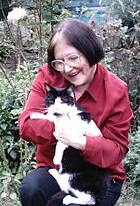In a short piece about herself which you can find on her website, Sheenagh Pugh remarks ‘I like to use poems to commemorate people and places, sometimes to amuse, to have a go at things I don't like (censorship, intolerance, pomposity) and above all to entertain’. http://sheenagh.wixsite.com/sheenaghpugh/aboutme
As the reading above is intended to indicate, ‘Toast’ can be said to do most of these things: it commemorates not only the building of what is currently called the Principality Stadium, but the workforce whose labours made this ‘mother-ship’ the landmark structure and focus for Wales’ capital city it has become. Pugh has herself described the poem as a ‘celebration’ of the summer it describes, which happened to be a particularly hot one, ‘and the way people felt’. But ‘Toast’ also amuses, and might justifiably be said ‘to have a go at’ certain kinds of ‘intolerance’ and (in its casual, even slangy words and phrasing), the kind of self-consciously ‘poetic’ language and mannerisms which can seem ‘pompous’ to some readers.
Technically, the poem can be called a dramatic monologue, partly because it uses the first-person ‘I’ (although there are elements traditionally associated with this form of monologue which this text doesn’t observe: identifying its speaker, for example). Like most poets, Pugh positively discourages readers from assuming that the voice of one of her poems is actually hers. She warns students who are studying her work: ‘Above all, don't suppose that “I” is necessarily the poet. Poets have a saying, “I is a lie”, and it’s often true. Writing in the first person doesn't mean you are writing of your own personal experience. Poets make things up; it's our job.’ http://sheenagh.wixsite.com/sheenaghpugh/exam-resources
That said, it is well worth paying attention to the ways in which the voice and diction of ‘Toast’ help to direct and influence the way the text works, and affect the reader. Note firstly, for example, how the palette of images weaving through the text is (unobtrusively but tightly) restricted to words or expressions associated with youth, age and/or the passage of time: ‘forget’, ‘unripe’, ‘browning slowly’, ‘clock’, ‘sand’, ‘grey’…
In its interest in time, and linking of this with bodies, youth, beauty and desire, this poem openly and deliberately converses with its own long literary history: the ‘lyric poem’ has been used to examine and celebrate love, its causes and effects, and to lament or disclaim the deleterious passage of time on the human body, from the very first. From this perspective Pugh is doing nothing very different from those astonishing sixteenth- and seventeenth-century writers who made this habit so much a part of what scholars still call the ‘English’ poetry tradition: Wyatt, Shakespeare, Donne, Marvell and their peers. The humorous stance and flavour of this text might seem surprising, but even a casual reading of Shakespeare’s sonnets, for example, and certainly Donne will rapidly confirm that humour, sometimes in the rather obvious form of (often saucy) puns, but also irony, sardony and satire, play an important part in the courtly romance traditions which these writers drew from medieval European literature and made their own.
One way in which Pugh rings the changes on that literary history is her choice of the couplet, rather than sonnet, for her poem, even if in doing so she is careful to retain some of the sonnet’s architectural balancing of scene-setting and reflection as outlined above. More seriously and significantly, Pugh’s poem also discreetly upends two central habits of that same long-lived tradition. Firstly she turns the poem’s gaze on the young men it celebrates. In doing so, ‘Toast’, as suggested, dismisses many centuries of writing in which the speaker’s gaze is male, and directed, whether in tender devotion or lust, at the usually young, often unavailable, and invariably silent woman he has chosen as object of and for his desire. This swipe at literary convention mischievously reverses the gender power relations the tradition presumes on, and seems part and parcel of the poem’s serious/comic intentions overall. That said, the sun-worshipping workmen are still mute, and to some extent thus silently objectified by the unashamedly desirous gaze of the speaker, as well as other shoppers who ‘sauntered by, whistling’, male and female. However, it is hard to argue with the speaker’s conclusion that the workmen welcome the attention (‘happily up for it’), given the lack of self-consciousness in their self-display. After all, those who didn’t want to be constructed as ‘Sex objects’ were presumably eating their lunches, clothed, somewhere less visible. In allowing us to evaluate the scene for ourselves, Pugh ensures that her speaker avoids exploiting the objectifying power of the (usually male) gaze which male poets have long presumed on, and implicitly thumbs her nose at that – again long-lived – convention.






In a short piece about herself which you can find on her website, Sheenagh Pugh remarks ‘I like to use poems to commemorate people and places, sometimes to amuse, to have a go at things I don't like (censorship, intolerance, pomposity) and above all to entertain’. http://sheenagh.wixsite.com/sheenaghpugh/aboutme
As the reading above is intended to indicate, ‘Toast’ can be said to do most of these things: it commemorates not only the building of what is currently called the Principality Stadium, but the workforce whose labours made this ‘mother-ship’ the landmark structure and focus for Wales’ capital city it has become. Pugh has herself described the poem as a ‘celebration’ of the summer it describes, which happened to be a particularly hot one, ‘and the way people felt’. But ‘Toast’ also amuses, and might justifiably be said ‘to have a go at’ certain kinds of ‘intolerance’ and (in its casual, even slangy words and phrasing), the kind of self-consciously ‘poetic’ language and mannerisms which can seem ‘pompous’ to some readers.
Technically, the poem can be called a dramatic monologue, partly because it uses the first-person ‘I’ (although there are elements traditionally associated with this form of monologue which this text doesn’t observe: identifying its speaker, for example). Like most poets, Pugh positively discourages readers from assuming that the voice of one of her poems is actually hers. She warns students who are studying her work: ‘Above all, don't suppose that “I” is necessarily the poet. Poets have a saying, “I is a lie”, and it’s often true. Writing in the first person doesn't mean you are writing of your own personal experience. Poets make things up; it's our job.’ http://sheenagh.wixsite.com/sheenaghpugh/exam-resources
That said, it is well worth paying attention to the ways in which the voice and diction of ‘Toast’ help to direct and influence the way the text works, and affect the reader. Note firstly, for example, how the palette of images weaving through the text is (unobtrusively but tightly) restricted to words or expressions associated with youth, age and/or the passage of time: ‘forget’, ‘unripe’, ‘browning slowly’, ‘clock’, ‘sand’, ‘grey’…
In its interest in time, and linking of this with bodies, youth, beauty and desire, this poem openly and deliberately converses with its own long literary history: the ‘lyric poem’ has been used to examine and celebrate love, its causes and effects, and to lament or disclaim the deleterious passage of time on the human body, from the very first. From this perspective Pugh is doing nothing very different from those astonishing sixteenth- and seventeenth-century writers who made this habit so much a part of what scholars still call the ‘English’ poetry tradition: Wyatt, Shakespeare, Donne, Marvell and their peers. The humorous stance and flavour of this text might seem surprising, but even a casual reading of Shakespeare’s sonnets, for example, and certainly Donne will rapidly confirm that humour, sometimes in the rather obvious form of (often saucy) puns, but also irony, sardony and satire, play an important part in the courtly romance traditions which these writers drew from medieval European literature and made their own.
One way in which Pugh rings the changes on that literary history is her choice of the couplet, rather than sonnet, for her poem, even if in doing so she is careful to retain some of the sonnet’s architectural balancing of scene-setting and reflection as outlined above. More seriously and significantly, Pugh’s poem also discreetly upends two central habits of that same long-lived tradition. Firstly she turns the poem’s gaze on the young men it celebrates. In doing so, ‘Toast’, as suggested, dismisses many centuries of writing in which the speaker’s gaze is male, and directed, whether in tender devotion or lust, at the usually young, often unavailable, and invariably silent woman he has chosen as object of and for his desire. This swipe at literary convention mischievously reverses the gender power relations the tradition presumes on, and seems part and parcel of the poem’s serious/comic intentions overall. That said, the sun-worshipping workmen are still mute, and to some extent thus silently objectified by the unashamedly desirous gaze of the speaker, as well as other shoppers who ‘sauntered by, whistling’, male and female. However, it is hard to argue with the speaker’s conclusion that the workmen welcome the attention (‘happily up for it’), given the lack of self-consciousness in their self-display. After all, those who didn’t want to be constructed as ‘Sex objects’ were presumably eating their lunches, clothed, somewhere less visible. In allowing us to evaluate the scene for ourselves, Pugh ensures that her speaker avoids exploiting the objectifying power of the (usually male) gaze which male poets have long presumed on, and implicitly thumbs her nose at that – again long-lived – convention.